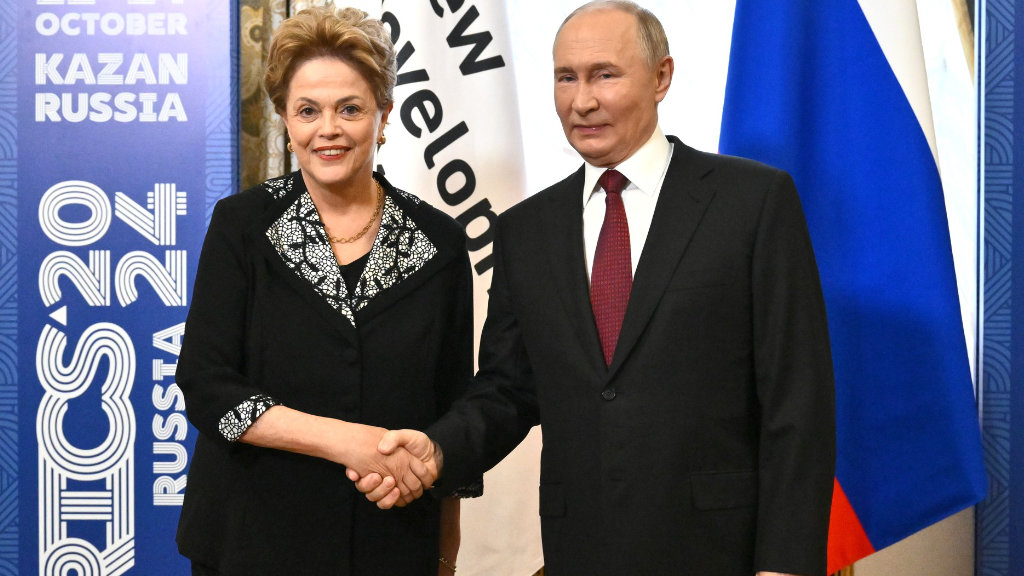The Russian President, Vladimir Putin, has met with the President of the BRICS New Development Bank (NDB), Dilma Rousseff. The NDB acts as a BRICS development platform and invests in infrastructure projects, often in the green sector, in BRICS nations. Equity investors include Algeria, Bangladesh, Brazil, China, Egypt, India, Russia, South Africa, United Arab Emirates, and Uruguay. The NDB has a curious scenario in that it is currently not investing in Russia so as not to fall foul of Western financial sanctions. It has an authorised capital of US$100 billion and is headquartered in Shanghai.
The meeting was also attended by Foreign Minister Sergei Lavrov, Deputy Prime Minister Alexei Overchuk, Deputy Chief of Staff of the Presidential Executive Office, Special Representative of the President of the Russian Federation for Financial and Economic Cooperation with BRICS States and Interaction with the New Development Bank Maxim Oreshkin, Presidential Aide Yury Ushakov, Minister of Finance Anton Siluanov, Central Bank Governor Elvira Nabiullina, and Director of the Latin America Department at the Foreign Ministry Alexander Shchetinin.
This is what President Putin had to say to Ms. Rousseff:
“Our previous meeting took place in June of this year in St Petersburg, on the sidelines of the International Economic Forum, where we deliberated on matters pertaining to the future operations of the Bank.
We hold in high regard the accomplishments you have achieved in recent years. It is, indeed, a strong, evolving and promising financial institution. Since 2018, the Bank has funded about 100 projects, amounting to a total investment of US$33 billion. The increase in the share of settlements denominated in national currencies helps reduce debt servicing costs, strengthen the financial independence of BRICS states, and minimise geopolitical risks, that is, free economic development from political influence, as much as possible in today’s world.
We anticipate your active engagement in the leaders’ meeting at the BRICS summit in Kazan. Your meetings with the BRICS leaders and your presentation on the Bank’s operations are also scheduled.”
Ms. Rousseff’s reply:
“It is a great pleasure for me to be here with the leadership of the Russian Federation. I believe that this BRICS meeting is of significant importance. At present, the countries of the Global South are in considerable need of financial resources, and the conditions for securing such resources are challenging.
As you have noted, we have indeed implemented and allocated a substantial amount of funds towards a variety of projects. However, this remains insufficient relative to the needs of the Global South. Therefore, it is crucial to provide funding in national currencies and in specialised formats. The New Development Bank is dedicated to this endeavour, funding not only sovereign projects but also private initiatives.
We are currently observing the BRICS group advancing through a new stage of its maturation. I am of the view that BRICS can also encompass additional countries from the Global South, enabling us to identify new areas and domains for cooperation. In this context, both the expansion of BRICS and our emphasis on ensuring the necessary financial resources for projects in the countries of the Global South are of paramount importance.”
Implications
Ms. Rousseff has apparently called for an expansion of the NDB’s investment capital, in response to two issues: there are many other projects that countries, especially in the Global South are in need of to enable them to reach their development potential. Secondly, the numbers of BRIC members are increasing, while the NDB’s authorised capital has remained the same since its founding in 2014. An NDB capitalisation increase may well be in the pipeline.
Looking ahead, it will be interesting to note when the NDB establishes any new branch as this would be indicative of new markets. This will be in line with BRICS expansion, however with branches currently in Johannesburg, Sao Paulo, Moscow and Ahmedabad, the MENA region could be under consideration and especially as Egypt, Ethiopia and the UAE have joined the group.
There are other issues coming to hand that may also change the nature of the bank from being a project financier to becoming involved in transactional services, and especially within the upcoming BRICS Pay financial payments system. In fact, the NDB may already be involved in some aspects – stakeholders in the BRICS Pay mechanisms remain secret. This may not be a direct involvement so as not to dilute the NDB’s core project financing mission, but it may well fund, hold equity or play an advisory role in the BRICS Pay platform.
Meanwhile, there are differences in lending policies with the NDB and typical Western multinational lenders such as the IMF. Typically, the latter impose relatively high interest rates based upon a specific countries credit rating, and to further mitigate against risk, also require political changes in sovereign makeup, usually demands for democratic processes (which can be manipulated) and issues concerning human rights. These are increasingly being seen as exploitative and unnecessarily liberal – such as contemporary LGBTQ and transgender issues.
In contrast, the NDB does not impose non-financial conditions, it accepts the loan risk purely on the viability and desirability of the project in hand. Examples of recent NDB investment projects can be seen here.
Further Reading
Zimbabwe Academic Compares IMF With BRICS Bank

 Русский
Русский













